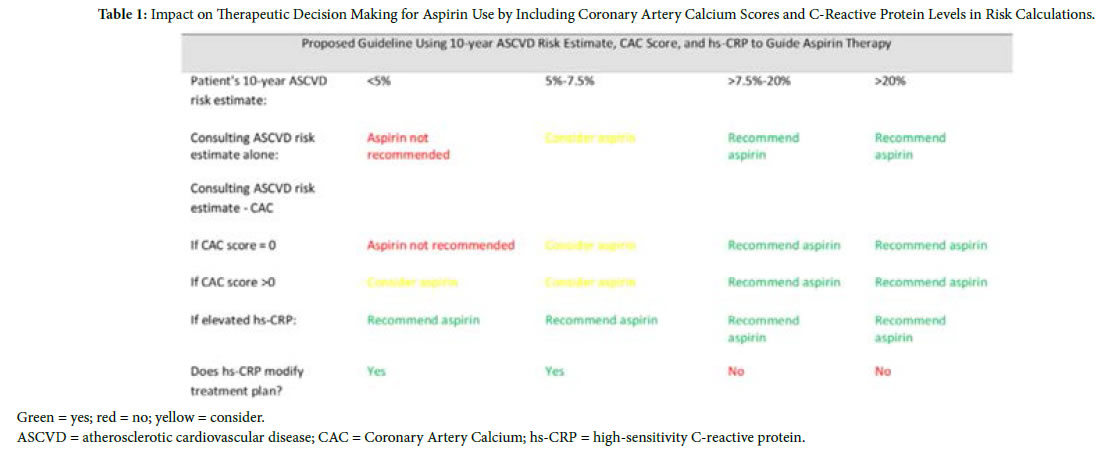The 2019 American Heart Association/American College of Cardiology guidelines for the primary prevention of atherosclerotic cardiovascular disease virtually preclude aspirin use for adults ages 40-70 unless at long-term high risk (>10% threshold by 10-year risk calculators) [1]. The cardiovascular complications of coronavirus-19 (COVID-19) infection may require us to reconsider this, however, to take short-term high risk into account. Likened to a cytokine tsunami,elevated levels of interleukin-6 and C-reactive protein predict cardiac and respiratory failure, indicatingthat inflammation mediates excess morbidity and mortality [2-4].While dipyridamole has been associated with clinical improvement which was not observed with angiotensin-converting enzyme inhibitors and angiotensin receptor blockers [5,6], the effect of aspirin on clinical outcomeshas yet to be reported. Based on evidence that inhibition of inflammation prevents cardiovascular events andthat low-dose aspirinconclusively reducedfirst heart attacks in middle-aged men in the randomized controlled Physicians Health Study [7,8], this latter approach has been recommended to protect athletes from theincreased risk of event-related cardiac arrest and sudden death triggered by inflammation due to exertional rhabdomyolysis [9-11]. Aspirin’s anti-inflammatory and anti-thrombotic effects may mitigate pandemic-related increased short-term risk, perhaps bluntingthe surge in coronary heart disease deaths which have occurredunder such conditions [12]. C-reactive protein levels can reliably stratify risk for low-dose aspirin as have coronary artery calcium scores for statin therapy [13,14] (Table 1).

Prophylactic low-dose aspirin usefor susceptible individuals presents a window of opportunity toreduce the cardiovascularcomplications of COVID-19 infection ahead of the second wave anticipated by the United States Center for Disease Control [15]. Based on inflammation as the root cause of atherothrombosis, a predominance of current clinical evidencesupports this interventionwithout a randomized controlled clinical trial asnecessary for novel interventions such as the high-dose interleukin-1 receptor antagonist tocilizumab [16]. Revised guidelines for primary prevention to accommodate short-term high risk may facilitate this goal as accomplished by subspecialty societies for treating acute myocardial infarction [17]. Preventing fatal strokes in young persons might be anunintended collateral benefit [18].
Keywords
Aspirin, Coronary heart disease, COVID-19 pandemic, Primarycardiovascular prevention
References
- Arnett DK, Blumenthal RS, Albert MA, Andrew B Buroker, Zachary D Goldberger, et al. (2019) 2019 ACC/AHA guidelines on the primary prevention of cardiovascular disease. J Am CollCardiol4:e177-e232. [crossref]
- Long B, Brady WJ, Koyfman A, Gottlieb M (2020) Cardiovascular complications in COVID–19.Am J Emerg Med38: 1504-1507. [crossref]
- Clerkin KJ, Fried JA, Raikhelker J, Gabriel Sayer, Jan M Griffin, et al. (2020) Coronavirus disease 2019 (COVID-19) and cardiovascular disease. Circulation141:1648-1655. [crossref]
- Heriod T, Jurinovic V, Arnreich C, Brian J. Lipworth, Johannes C. Hellmuth, et al. (2020) Elevated levels of interleukin-6 and C-reactive protein predict the need for mechanical ventilation inCOVID-19. J Allergy Clin Immunol. 146: 128-136. [crossref]
- Liu X, Li Z, Liu S, Sun J, Chen Z, et al. (2020) Potential therapeutic effects of dipyridamole in the severely ill patients with COVID-19. ActaPharmaceuticaSinica B [crossref]
- Guo T, Fan Y, Chen M, Xiaoyan Wu, Lin Zhang, et al. (2020) Cardiovascular implications of fatal outcomes of patients with coronavirus disease 2019 (COVID-19).JAMA Cardiol 5:1-8. [crossref]
- Ridker PM, Libby P, MacFadyen JG, Tom Thuren, Christie Ballantyne, et al. (2018) Modulation of the interleukin-6 signalingpathway and incidence rates of atherosclerotic events and all-cause mortality: analysis from the Canakinumab Anti-Inflammatory Thrombosis Outcomes Study (CANTOS).EurHeart J 39: 3499-3507. [crossref]
- Steering Committee of the Physicians’ Health Study Research Group (1989) Final report on the aspirin component of the ongoing Physicians’ Health Study. N Engl J Med 321: 129-135. [crossref]
- Siegel AJ (2015) Pre-race aspirin to protect susceptible runners from cardiac arrest during marathon: is opportunity knocking? Open Heart2:e000102. [crossref]
- Siegel AJ, Noakes TD (2017) Can pre-race aspirin prevent sudden cardiac death during marathons? Br J Sports Med 51:1579-1581. [crossref]
- Siegel AJ, Noakes TD (2019) Aspirin to prevent sudden cardiac death in athletes with high coronary artery calcium scores. Am J Med132:138-141. [crossref]
- Madjid M, Miller CC, Zarubaev VV, Ivan G Marinich, Oleg I Kiselev, et al. (2007) Influenza epidemics and acute respiratory disease activity are associated with a surge in autopsy-confirmed coronary heart disease deaths: results from 8 years of autopsies in 34,892 subjects.Eur Heart J 28: 1205-1210. [crossref]
- Greenland P, Blaha MJ, Budoff MJ, Erbel R, Watson KE (2018) Coronary calcium scores and cardiovascular risk.J Am CollCardiol72: 434-447. [crossref]
- Siegel AJ (2020) Aspirin to Reduce Risk for Sudden Cardiac Death in Athletes with Elevated C-Reactive Protein Levels: Preventing exertional cardiac arrest in high-risk athletes.Am J Med133(9). doi.org/10.1016/j.amjmed.2020.04.004.
- Sun LH (2020) CD director warns second wave of coronavirus is likely to be even more devastating.Washington Post.
- Xu X, Han M, Li T, Wei Sun, Dongsheng Wang, et al. (2020) Effective treatment of severe COVID–19 patients with tocilizumab. ProcNatlAcadSci 117:10970-10975. [crossref]
- SCAI, ACC and ACEP release consensus on management of AMI patients amid COVID-19–pandemic (2020) SCAI, ACC and ACEP release consensus on management of AMI patients amid COVID-19 pandemic.
- Oxley TJ, Mocco J, Majidi S, Christopher P Kellner, HazemShoirah, et al. (2020) Large vessel strokes as a presenting feature of Covid-19 in the young. N Engl J Med. 382:e60. [crossref]